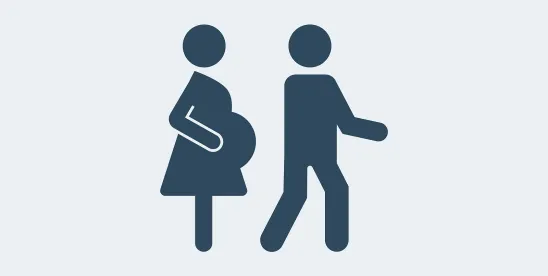There have been several recent lawsuits challenging the Equal Employment Opportunity Commission’s (EEOC)’s regulation implementing the Pregnant Workers Fairness Act (PWFA) and its inclusion of abortions in its definition of the “related medical conditions” for which employers are required to provide accommodations. The courts hearing these challenges have reached different conclusions about whether the EEOC exceeded its authority by including elective abortions within the PWFA’s definition of pregnancy-related conditions. Despite these legal challenges to the regulation, the protections contained in the statute remain in full effect, and subject to an undue hardship defense, employers must provide employees with accommodations for all pregnancy-related medical conditions, with a limited exception in two states.
Summary of the PWFA
The PWFA is a federal law that requires private employers with 15 or more employees to grant temporary, reasonable accommodations to workers with known limitations related to pregnancy, childbirth, or related medical conditions unless doing so would result in undue hardship. In other words, the PWFA prohibits employers from denying pregnant workers employment opportunities by failing to provide necessary accommodations. Employers are also prohibited from retaliating against employees for requesting reasonable accommodations.
Congress passed the PWFA in order to fill gaps in federal law that historically did not provide pregnant workers with accommodations that would allow them to work safely. Before the passage of the PWFA, Title VII prohibited discrimination based on pregnancy and the Americans with Disabilities Act (ADA) required reasonable accommodations for disabilities, but neither law required reasonable accommodations for the mine run of pregnancy-related disabilities, which often fall short of “disabilities” as defined by the ADA. For more information on the PWFA’s protections, and the protections afforded by the Providing Urgent Maternal Protections for Nursing Mothers (PUMP) Act, see KBK’s previous blog post on the topic.
In passing the PWFA, Congress directed the EEOC to adopt regulations explaining the PWFA’s application and how the statute operates in practice. The EEOC issued its Final Rule interpreting the PWFA on April 15, 2024; the Final Rule went into effect on June 18, 2024. The Final Rule is intended to provide guidance to employees on their protections under the PWFA and to employers on their obligations under the law. Among other contributions, the Final Rule:
- Provides examples of reasonable accommodations, including frequent rest breaks; schedule changes; teleworking; paid leave; light duty; and even temporary suspension of one or more essential job functions;
- Makes clear that certain accommodations are per se reasonable and should be granted as a matter of course, including additional restroom breaks, breaks for food and drink, and accommodations to sit instead of stand;
- Clarifies that there is no requirement that medical conditions rise to the level of a disability under the ADA in order to be eligible for accommodation, such that temporary and relatively mild conditions like morning sickness or pregnancy-related fatigue are covered by the PWFA;
- Explains what constitutes an “undue hardship”;
- Clarifies the definition of “pregnancy, childbirth, or related medical conditions” and confirms that it includes conditions related to getting pregnant or having the ability to get pregnant (including fertility treatments, contraception, and menstruation), the postpartum period (including lactation), and the termination of a pregnancy (including miscarriage and abortion).
The Final Rule’s inclusion of abortions within the definition of “pregnancy, childbirth, and related medical conditions” means that employers are required to accommodate all abortions, whether necessitated by an emergency or other medical condition, or by some other circumstances. Such accommodations might require that an employer allow an employee to take leave to procure an abortion, but neither the statute nor the regulation require employers to provide or pay for abortion procedures, nor do they require employers to pay for travel-related expenses for an employee to obtain an abortion. As explained in the EEOC’s Final Rule, abortions, whether prompted by choice or a medical condition, necessarily constitute an example of a pregnancy-related condition. Inclusion of abortions within the definition of “related medical conditions” is consistent with courts’ longstanding interpretations of the same language in Title VII.
Challenges to the PWFA
Since the publication of the Final Rule in April, there have been several legal challenges to the Rule’s inclusion of abortions in its definition of covered medical conditions, particularly where the abortion is sought for non-medical reasons, which challengers term an “elective” abortion. These challenges came from states that had passed abortion bans following the 2022 Supreme Court decision in Dobbs v. Jackson Women’s Health Organization, which overturned Roe v. Wade and held that the Constitution does not provide or protect a right to abortion, as well as from a group of Catholic organizations.
First, on April 25, 2024, seventeen states filed suit in the U.S. District Court for the District of Arkansas to stay the effective date of the Final Rule and block enforcement of the rule in their states.[1] Then, in late-May, the attorneys general of Louisiana and Mississippi and several Catholic organizations, led by the United States Conference of Catholic Bishops, filed two separate suits in the U.S. District Court for the Western District of Louisiana challenging the Final Rule on similar grounds, and sought a preliminary injunction to halt its implementation. The Louisiana district court consolidated the two motions for preliminary injunction in the cases before it and ruled on them in a single order.
Each of these lawsuits focused on the EEOC’s application of the PWFA’s accommodation requirements to so-called “elective” abortions. The Plaintiff States and Catholic organizations argued that the Final Rule conflicted with the holding in Dobbs, went further than the original scope of the PWFA, broke faith with the text of the statute, violated the requirements of the Administrative Procedures Act, and offended the Constitution. At bottom, they argued that the EEOC overstepped its authority by including abortion within the definition of pregnancy-related medical conditions for which employers need to provide employees with reasonable accommodations. Their specific textual argument was that an abortion is not a medical “condition” but rather a procedure, and thus not encompassed within the language of the PWFA. In addition, they pointed to policy reasons for overturning the Final Rule, namely that it was in tension with their state laws, which banned abortion, and would require the states to spend money and resources enforcing a law in conflict with their laws. The Catholic organizations argued that forcing them to provide accommodations for “elective” abortions sought by their employees would conflict with the organizations’ religious beliefs.
The EEOC, for its part, defended its PWFA regulation on the merits and argued that the Plaintiff States lacked standing to bring the case because the injuries that they asserted were speculative and were not traceable to the regulation or redressable by a stay of the implementation of the PWFA. Several groups also filed amicus briefs in defense of the PWFA.
The courts handling these two challenges reached different conclusions.
The Arkansas district court held that the seventeen states’ attorneys general did not have standing to challenge the Final Rule and had not shown a likelihood of irreparable harm from the Final Rule. As articulated by the Court, there was a low likelihood that an employee in one of their jurisdictions would seek an accommodation to obtain an “elective” abortion, given that the Plaintiff States had banned abortions. Further, even if an employee were to seek such an accommodation, and one of the Plaintiff States were to deny such an accommodation request, the EEOC cannot bring enforcement actions against state employers, such that any enforcement action against the Plaintiff States that would result in their alleged harm would have to come from an employee or the Department of Justice, neither of which was before the Court. The States sought a stay pending their appeal to the Eighth Circuit, but that court denied the motion on June 25, 2024.
The Louisiana district court, on the other hand, held that the EEOC had exceeded its statutory authority and granted a narrow preliminary injunction postponing the effective date of the “Final Rule’s requirement that covered entities provide accommodation for the elective abortions of employees that are not necessary to treat a medical condition related to pregnancy” until final judgment is entered in the pending litigation. Effectively, the EEOC will not be able to investigate any claims that an employer failed to accommodate a pregnant employee seeking an elective abortion in Louisiana or Mississippi or if the at-issue employer is one of the four Catholic organizations that sued the EEOC.
Takeaways
Irrespective of these challenges, the PWFA’s protections, as clarified by the EEOC’s Final Rule, are in full effect for employees who do not work in Louisiana or Mississippi or for one of the four Catholic organizations that filed suit. Employees who do not work in these Plaintiff States or for the Plaintiff Catholic organizations are entitled to reasonable accommodations for pregnancy-related medical conditions, including leave to obtain an elective abortion, and employers are required to provide these reasonable accommodations. And, even in Louisiana and Mississippi, all of the PWFA’s protections other than the requirement that employers provide accommodations for employees to access elective abortions remain in effect—meaning that employees are still protected in their access to accommodations like light duty, additional bathroom breaks, and schedule changes and to accommodations for abortions related to the treatment of a medical condition.
Challenges to the EEOC’s Final Rule are likely to continue to percolate through the courts until they reach the Supreme Court and are conclusively resolved. These challenges probably will be strengthened by arguments that the EEOC regulation is not entitled to any deference in its rulemaking since the Supreme Court decision this summer in Loper Bright Enterprises v. Raimondo did away with the Chevron doctrine that had required deference to agency regulations that provided reasonable interpretations of ambiguous statutory provisions.
[1] The states that filed the lawsuit were Alabama, Arkansas, Florida, Georgia, Idaho, Iowa, Kansas, Missouri, Nebraska, North Dakota, Oklahoma, South Carolina, South Dakota, Tennessee, Utah, and West Virginia.




 />i
/>i
